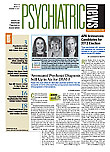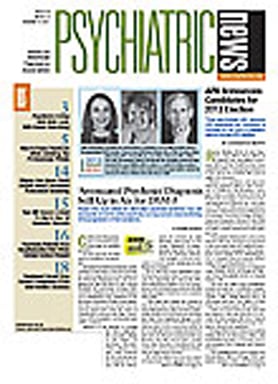Seven years ago Facebook began its astounding journey from a site for Harvard students to by far the largest social-networking site on the planet.
The site now claims an astonishing 700 million users worldwide. And among them are more than a few psychiatrists.
Their reasons for joining the Facebook throngs are quite varied, some of them told Psychiatric News.
"It was a few years back," Raymond Lam, M.D., a professor of psychiatry at the University of British Columbia, recounted during an interview. "After a trip to the Galapagos Islands, several friends and I were looking for ways to share photos of the trip. We thought, maybe Facebook is the way to do it. That is how I got started, and now I'm a Facebook junkie."
"I signed up for Facebook about two years ago when a younger colleague said, 'Oh, you should sign up for Facebook,' " said Jack Drescher, M.D., a clinical associate professor of psychiatry at New York Medical College. "And when I asked, 'Why?' she said, 'Oh, you'll enjoy it.' "
As for Gerrit Glas, M.D., Ph.D., a professor of psychiatry and philosophy at Leiden University in the Netherlands, he signed up for Facebook "when I noticed that my children shared information there that was relevant for me too," he told Psychiatric News.
Psychiatrists who are signed up with Facebook indicate that they are receiving different types of gratification from the experience.
Petros Levounis, M.D., an associate clinical professor of psychiatry at Columbia University, has 347 friends on Facebook, he reported during an interview—friends from high school, college, medical school, current friends, as well as relatives back in Greece—and he enjoys sharing information with them.
As for Carol Bernstein, M.D., an associate professor of psychiatry at New York University and immediate past APA president, she has about 300 friends on Facebook, who include old-time friends and people from work, and she indicated that she enjoys hearing from them and providing them with information, especially about her teenage daughter.
"For me personally," Drescher said, "I am a gay psychiatrist, a gay man, and I have had a lot of losses of friends since the 1980s, starting in my 30s. I am now 59 years old. For example, during my internship here in New York City at St. Vincent's Hospital in Greenwich Village, there were four gay men; I'm the only one left alive. Then four years ago, three straight friends—people in their 50s and 60s—died in the same year. So I have the feeling that there are holes in the tapestry of my life right now, and Facebook is helping me connect some of the pieces."
On Facebook, you can choose settings so that the information or photos you post can be seen only by those you have "friended." Psychiatrists who use Facebook hold varying opinions about the use of these settings.
"I enjoy Facebook as a mechanism to share photos with family members and stay in touch with friends," Sarah Johnson, M.D., an addiction psychiatry fellow at the University of Louisville and the member-in-training trustee on the APA Board, said. "However, as a psychiatrist, I am aware of the potential for boundary issues in the world of social media. I am always careful to maintain high privacy settings and chose not to list my home address and phone number and listed a false birthday when creating my Facebook profile. Residents especially should also be aware that their postings can be viewed by their fellow trainees and supervisors, and they should keep professionalism in mind when deciding what to share with their virtual networks."
"As a training analyst," Drescher explained, "I sometimes have therapists as patients, and one of my therapist patients, who is more technologically savvy than I am, explained to me shortly after I joined Facebook that he could see my pictures on it. He said, 'You need to put up your privacy settings.' So I did."
"I'm not sure about the privacy settings," said Bernstein. "I think that whatever I post is out there for anyone who looks. But I suspect that most of them are like me and don't pay much attention."
As for Levounis, he doesn't use privacy settings. "I thought about it, but then decided that information is so easily accessible these days that it would be pretty much a losing battle to try to control it."
Some who use privacy settings, such as Glas, have experienced no negative impact. The same also applies to some who do not use privacy settings, such as Bernstein and Levounis.
Other psychiatrists, however, have experienced difficulties. "The first thing that happened after I joined Facebook," Drescher said, "is that two patients sent me friend requests. I brought it up during the next session and explained to them that I wasn't going to be befriending any of my patients because I didn't want to have to explain to anybody else why they were on my friends list."
Still other psychiatrists have found that Facebook has positively impacted them professionally.
For example, Lam and his colleagues at the Canadian Network for Mood and Anxiety Treatments are planning to set up a group Facebook page for people who will be participating in their multicenter study on depression biomarkers.
Finally, in view of the personal and professional experiences that they've had with Facebook, would these psychiatrists recommend that other psychiatrists become Facebook devotees?
"Yes," said Glas, "but only for private use or as a member of an organization."
"I would," said Lam. "But the issue is, you have to be very careful about the privacy settings."
"I would say, you shouldn't be afraid of it," Levounis asserted. "The idea that we should be blank slates, that our patients know absolutely nothing about us, is something of the past. In the age where we now live, you are just one click away from having your life shared with the world."

How to Enjoy Facebook And Stay Out of Trouble
Hunter McQuistion, M.D., an associate clinical professor of psychiatry at Columbia University, is a member of Facebook—but reluctantly.
He signed up three years ago because a friend asked him to, and since then has only accepted about 40 friends on Facebook who are his friends in real life. He maintains no profile on Facebook other than his name, gender, and birthday. "I am nothing more than a silhouette as opposed to a picture," he said. He posts no information or photos on his Facebook page for his friends to see. "I do not interact on Facebook to be perfectly honest," he said. "I don't do anything in social media, at least at this point, because I don't completely trust the security."
Not surprisingly, McQuistion has experienced no professional difficulties since joining Facebook except for a "friend" solicitation from a patient currently living outside the country. But because of his extremely circumspect position, he can't have much fun on Facebook either.
So how can a psychiatrist enjoy Facebook without getting into professional trouble? Some of the psychiatrists who use Facebook offer the following suggestions:
Use Privacy Settings: The best way to make sure that your private information on Facebook is not viewed by your patients is to set up privacy settings. The problem, however, is that the settings are "a bit arcane," Raymond Lam, M.D., a professor of psychiatry at the University of British Columbia, reported. "It's hard to get access to them and to figure them out, especially if you're not very tech savvy. That's why, I think, there is interest in the Google Plus social network, which started up several months ago. It is much easier to figure out its security settings [than Facebook's] and to have different circles of friends who have different access to your information. It is a much easier, more intuitive process."
Do Not "Friend" Your Patients: When patients want to be their friends on Facebook, the psychiatrists interviewed all agreed that they would not grant such requests because of professional boundary violations.
But how to handle such requests? Just ignore them, Lam recommended. That is what he does. "And if they later say, 'Hey, I tried to contact you on Facebook and you didn't respond,' I tell them that I use Facebook only for personal reasons, and they accept that," he said.
Yet Petros Levounis, M.D., an associate clinical professor of psychiatry at Columbia University, believes that there might be a more fruitful way of handling Facebook "friend" requests from patients—first, ignore the patients' requests, but then ask them in therapy why they wanted to be your friend. "I would be interested in knowing what their motive is," he explained. "I would use the information to help unpack the relationship in the transference and work dynamically with them on that."
Control What Others Put on Your Page: "It's not as if anybody can put things on your Facebook page without your having some control over it," Levounis noted. For example, a friend might upload a photo onto Facebook that shows you at the beach or in a provocative pose and that "tags"—identifies—you. The photo then shows up on your Facebook page. But it's pretty easy to "de-tag" the photo—that is, remove your identification from it. And after that, the photo disappears from your page.


